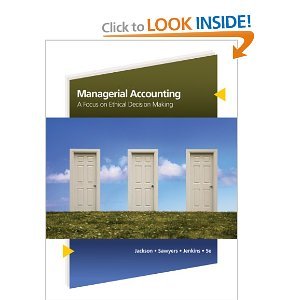Answered step by step
Verified Expert Solution
Question
1 Approved Answer
On January 1, the partners of Van, Bakel, and Cox (who share profits and losses in the ratio of 5:3:2, respectively) decide to terminate operations
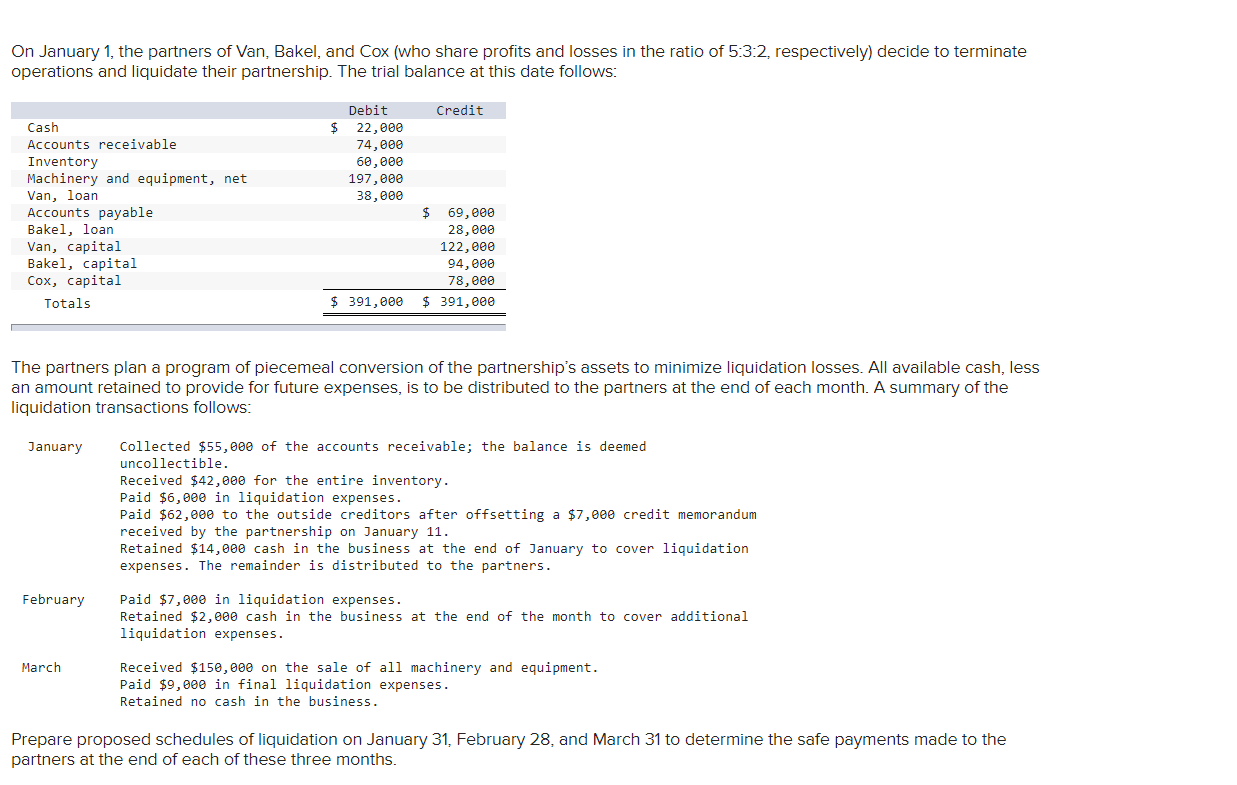
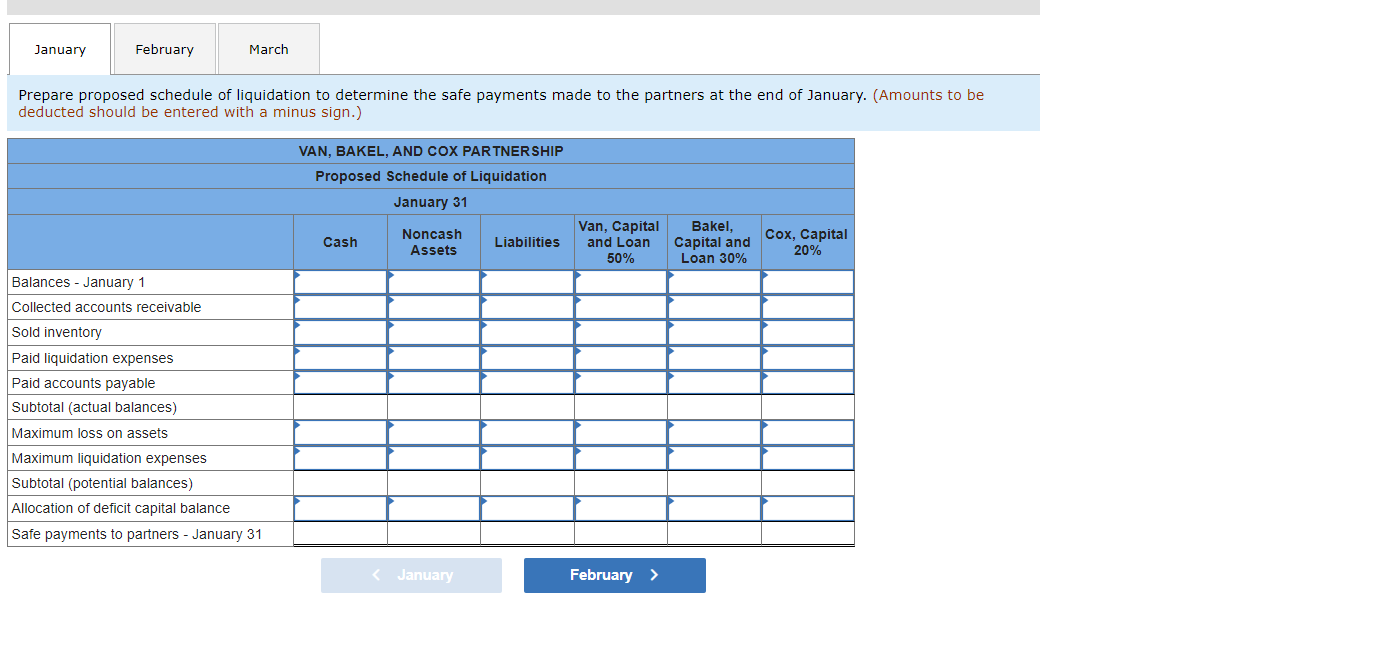
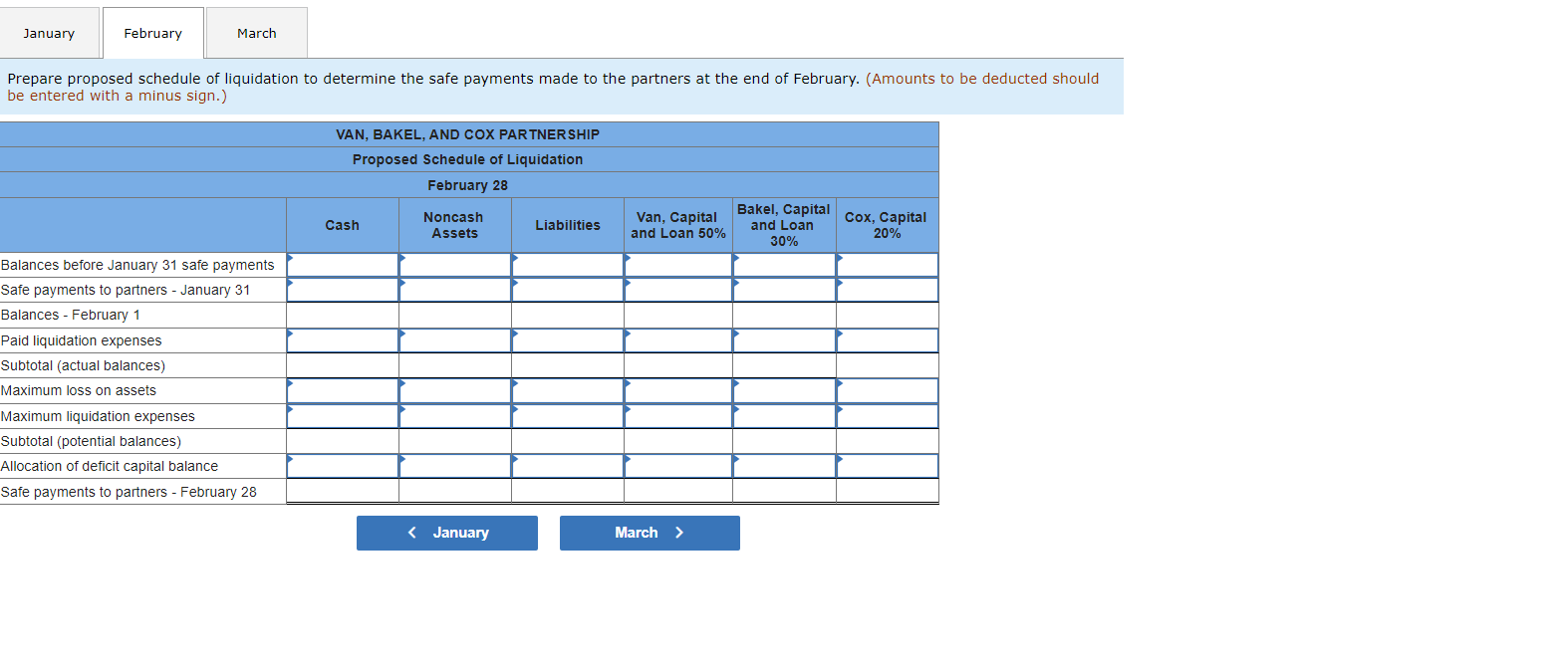
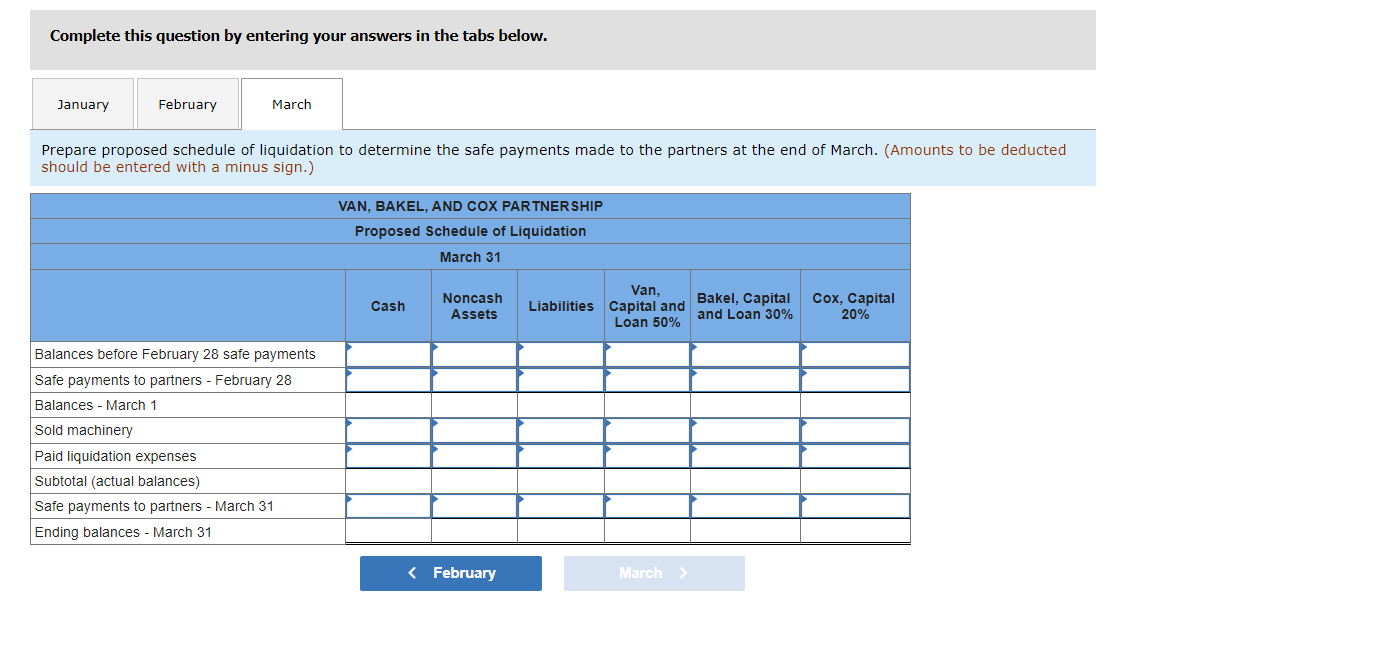 On January 1, the partners of Van, Bakel, and Cox (who share profits and losses in the ratio of 5:3:2, respectively) decide to terminate operations and liquidate their partnership. The trial balance at this date follows: The partners plan a program of piecemeal conversion of the partnership's assets to minimize liquidation losses. All available cash, less an amount retained to provide for future expenses, is to be distributed to the partners at the end of each month. A summary of the liquidation transactions follows: January Collected $55,000 of the accounts receivable; the balance is deemed uncollectible. Received $42,000 for the entire inventory. Paid $6,000 in liquidation expenses. Paid $62,000 to the outside creditors after offsetting a $7,000 credit memorandum received by the partnership on January 11 . Retained $14,000 cash in the business at the end of January to cover liquidation expenses. The remainder is distributed to the partners. February Paid $7,000 in liquidation expenses. Retained $2,000 cash in the business at the end of the month to cover additional liquidation expenses. March Received $150,000 on the sale of all machinery and equipment. Paid $9,000 in final liquidation expenses. Retained no cash in the business. January Collected $55,000 of the accounts receivable; the balance is deemed uncollectible. Received $42,000 for the entire inventory. Paid $6,000 in liquidation expenses. Paid $62,000 to the outside creditors after offsetting a $7,000 credit memorandum received by the partnership on January 11. Retained $14,000 cash in the business at the end of January to cover liquidation expenses. The remainder is distributed to the partners. February Paid $7,000 in liquidation expenses. Retained $2,000 cash in the business at the end of the month to cover additional liquidation expenses. March Received $150,000 on the sale of all machinery and equipment. Paid $9,000 in final liquidation expenses. Retained no cash in the business. Prepare proposed schedules of liquidation on January 31, February 28, and March 31 to determine the safe payments made to the partners at the end of each of these three months. Prepare proposed schedule of liquidation to determine the safe payments made to the partners at the end of January. (Amounts to be deducted should be entered with a minus sign.) Prepare proposed schedule of liquidation to determine the safe payments made to the partners at the end of February. (Amounts to be deducted should be entered with a minus sign.) Complete this question by entering your answers in the tabs below. Prepare proposed schedule of liquidation to determine the safe payments made to the partners at the end of March. (Amounts to be deducted should be entered with a minus sign.) On January 1, the partners of Van, Bakel, and Cox (who share profits and losses in the ratio of 5:3:2, respectively) decide to terminate operations and liquidate their partnership. The trial balance at this date follows: The partners plan a program of piecemeal conversion of the partnership's assets to minimize liquidation losses. All available cash, less an amount retained to provide for future expenses, is to be distributed to the partners at the end of each month. A summary of the liquidation transactions follows: January Collected $55,000 of the accounts receivable; the balance is deemed uncollectible. Received $42,000 for the entire inventory. Paid $6,000 in liquidation expenses. Paid $62,000 to the outside creditors after offsetting a $7,000 credit memorandum received by the partnership on January 11 . Retained $14,000 cash in the business at the end of January to cover liquidation expenses. The remainder is distributed to the partners. February Paid $7,000 in liquidation expenses. Retained $2,000 cash in the business at the end of the month to cover additional liquidation expenses. March Received $150,000 on the sale of all machinery and equipment. Paid $9,000 in final liquidation expenses. Retained no cash in the business. January Collected $55,000 of the accounts receivable; the balance is deemed uncollectible. Received $42,000 for the entire inventory. Paid $6,000 in liquidation expenses. Paid $62,000 to the outside creditors after offsetting a $7,000 credit memorandum received by the partnership on January 11. Retained $14,000 cash in the business at the end of January to cover liquidation expenses. The remainder is distributed to the partners. February Paid $7,000 in liquidation expenses. Retained $2,000 cash in the business at the end of the month to cover additional liquidation expenses. March Received $150,000 on the sale of all machinery and equipment. Paid $9,000 in final liquidation expenses. Retained no cash in the business. Prepare proposed schedules of liquidation on January 31, February 28, and March 31 to determine the safe payments made to the partners at the end of each of these three months. Prepare proposed schedule of liquidation to determine the safe payments made to the partners at the end of January. (Amounts to be deducted should be entered with a minus sign.) Prepare proposed schedule of liquidation to determine the safe payments made to the partners at the end of February. (Amounts to be deducted should be entered with a minus sign.) Complete this question by entering your answers in the tabs below. Prepare proposed schedule of liquidation to determine the safe payments made to the partners at the end of March. (Amounts to be deducted should be entered with a minus sign.)
On January 1, the partners of Van, Bakel, and Cox (who share profits and losses in the ratio of 5:3:2, respectively) decide to terminate operations and liquidate their partnership. The trial balance at this date follows: The partners plan a program of piecemeal conversion of the partnership's assets to minimize liquidation losses. All available cash, less an amount retained to provide for future expenses, is to be distributed to the partners at the end of each month. A summary of the liquidation transactions follows: January Collected $55,000 of the accounts receivable; the balance is deemed uncollectible. Received $42,000 for the entire inventory. Paid $6,000 in liquidation expenses. Paid $62,000 to the outside creditors after offsetting a $7,000 credit memorandum received by the partnership on January 11 . Retained $14,000 cash in the business at the end of January to cover liquidation expenses. The remainder is distributed to the partners. February Paid $7,000 in liquidation expenses. Retained $2,000 cash in the business at the end of the month to cover additional liquidation expenses. March Received $150,000 on the sale of all machinery and equipment. Paid $9,000 in final liquidation expenses. Retained no cash in the business. January Collected $55,000 of the accounts receivable; the balance is deemed uncollectible. Received $42,000 for the entire inventory. Paid $6,000 in liquidation expenses. Paid $62,000 to the outside creditors after offsetting a $7,000 credit memorandum received by the partnership on January 11. Retained $14,000 cash in the business at the end of January to cover liquidation expenses. The remainder is distributed to the partners. February Paid $7,000 in liquidation expenses. Retained $2,000 cash in the business at the end of the month to cover additional liquidation expenses. March Received $150,000 on the sale of all machinery and equipment. Paid $9,000 in final liquidation expenses. Retained no cash in the business. Prepare proposed schedules of liquidation on January 31, February 28, and March 31 to determine the safe payments made to the partners at the end of each of these three months. Prepare proposed schedule of liquidation to determine the safe payments made to the partners at the end of January. (Amounts to be deducted should be entered with a minus sign.) Prepare proposed schedule of liquidation to determine the safe payments made to the partners at the end of February. (Amounts to be deducted should be entered with a minus sign.) Complete this question by entering your answers in the tabs below. Prepare proposed schedule of liquidation to determine the safe payments made to the partners at the end of March. (Amounts to be deducted should be entered with a minus sign.) On January 1, the partners of Van, Bakel, and Cox (who share profits and losses in the ratio of 5:3:2, respectively) decide to terminate operations and liquidate their partnership. The trial balance at this date follows: The partners plan a program of piecemeal conversion of the partnership's assets to minimize liquidation losses. All available cash, less an amount retained to provide for future expenses, is to be distributed to the partners at the end of each month. A summary of the liquidation transactions follows: January Collected $55,000 of the accounts receivable; the balance is deemed uncollectible. Received $42,000 for the entire inventory. Paid $6,000 in liquidation expenses. Paid $62,000 to the outside creditors after offsetting a $7,000 credit memorandum received by the partnership on January 11 . Retained $14,000 cash in the business at the end of January to cover liquidation expenses. The remainder is distributed to the partners. February Paid $7,000 in liquidation expenses. Retained $2,000 cash in the business at the end of the month to cover additional liquidation expenses. March Received $150,000 on the sale of all machinery and equipment. Paid $9,000 in final liquidation expenses. Retained no cash in the business. January Collected $55,000 of the accounts receivable; the balance is deemed uncollectible. Received $42,000 for the entire inventory. Paid $6,000 in liquidation expenses. Paid $62,000 to the outside creditors after offsetting a $7,000 credit memorandum received by the partnership on January 11. Retained $14,000 cash in the business at the end of January to cover liquidation expenses. The remainder is distributed to the partners. February Paid $7,000 in liquidation expenses. Retained $2,000 cash in the business at the end of the month to cover additional liquidation expenses. March Received $150,000 on the sale of all machinery and equipment. Paid $9,000 in final liquidation expenses. Retained no cash in the business. Prepare proposed schedules of liquidation on January 31, February 28, and March 31 to determine the safe payments made to the partners at the end of each of these three months. Prepare proposed schedule of liquidation to determine the safe payments made to the partners at the end of January. (Amounts to be deducted should be entered with a minus sign.) Prepare proposed schedule of liquidation to determine the safe payments made to the partners at the end of February. (Amounts to be deducted should be entered with a minus sign.) Complete this question by entering your answers in the tabs below. Prepare proposed schedule of liquidation to determine the safe payments made to the partners at the end of March. (Amounts to be deducted should be entered with a minus sign.) Step by Step Solution
There are 3 Steps involved in it
Step: 1

Get Instant Access to Expert-Tailored Solutions
See step-by-step solutions with expert insights and AI powered tools for academic success
Step: 2

Step: 3

Ace Your Homework with AI
Get the answers you need in no time with our AI-driven, step-by-step assistance
Get Started


